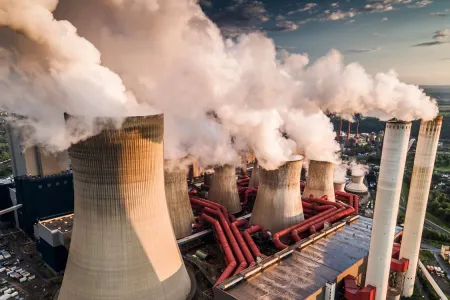Ed Miliband is currently facing what has been described as his first key test on Labour’s ambitions for global climate leadership, with a crucial decision looming on how far and how fast to cut the UK’s greenhouse gas emissions.
According to reports, the energy secretary is preparing a new international pledge for the UK to cut carbon sharply in the next decade, but could face opposition within the cabinet. Experts and campaigners told the Guardian the UK should make substantial cuts to carbon in the next 10 years, compared with its existing pledge. Lord Stern, the economist, said the new target should be a cut of at least 78% in carbon emissions, compared with 1990 levels, by 2035.
That is a substantial toughening of the existing pledge, under the Paris climate agreement, to cut emissions by 68% by 2030 – a pledge made by Boris Johnson in 2021 but which the UK is well off track in meeting.
Stern said: “A strong transition [to a low-carbon economy] and the investment and innovation which drives it is crucial to our own growth. If we commit and deliver, as we can, we will establish a much more attractive growth story than the dirty destructive models of the past. And we can show the way internationally.”
Mike Hemsley, the deputy director of the Energy Transitions Commission thinktank, agreed that 78% should be the key figure. “This is a reasonable number. We have seen an acceleration [of the move to clean energy] in the power sector, but there has not been much progress on buildings, which is needed,” he said.
Friends of the Earth said the figure of a 78% cut, which is taken from the UK’s current targets under the Climate Change Act, should equate to a minimum 82% cut if international aviation and shipping emissions are excluded. Mike Childs, head of policy, said: “We’d argue that the urgent need to prevent climate breakdown spiralling out of control requires the deepest cuts possible.
This must focus on cleaning up our act at home, because a significant proportion of our cuts to date have come from outsourcing manufacturing abroad rather than reducing emissions across sectors in the UK. But it must be matched with investment in a fair, green transition that protects jobs and communities.”
The question of what the pledge should be must be decided urgently. The prime minister, Keir Starmer, promised at the UN general assembly last month to present the UK’s next emissions-cutting pledge at the forthcoming UN climate summit, Cop29, in Azerbaijan from 11 November.
That is significantly in advance of the February deadline for submitting such plans – known as NDCs (nationally determined contributions) – to the UN, showing the UK’s determination to take a lead on the issue.
Before the autumn budget at the end of this month, the Climate Change Committee – the independent advisers to the government – will present their deliberations on what the headline emissions pledge should be. After that, Miliband and his advisers will have just over a fortnight to prepare at least a draft of the NDC, for presentation to other governments at Cop29.
Story was adapted from the Guardian.
